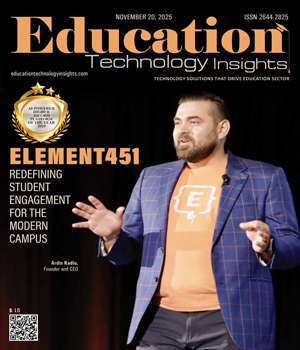THANK YOU FOR SUBSCRIBING
Be first to read the latest tech news, Industry Leader's Insights, and CIO interviews of medium and large enterprises exclusively from Education Technology Insights
Embedding AI in higher education through consultancy collaboration
Heli Harrikari, PhD, EMBA, Strategic Lead, ECIU University
 Heli Harrikari, PhD, EMBA, Strategic Lead, ECIU University
Heli Harrikari, PhD, EMBA, Strategic Lead, ECIU UniversityArtificial intelligence (AI) has entered our lives in unforeseen ways in the last 12 months. The hype of generative AI – albeit being only a form of AI - has invoked many exciting horizons, and more are being developed as we speak. The pace of AI developments is breathtaking and new visions of how AI will shape every corner of our future emerge daily.
Experts in many sectors wonder what to do with all the opportunities of AI. It is not simple to understand where to start, which tools are the best for which purposes, which processes can be well supported by AI, how to design human-machine interaction optimally in workflows, and what are the ethical consequences of all this. The exciting opportunities can also feel overwhelming.
Integrating AI in higher education implies considering how we can best use AI for learning and teaching, to support our pedagogical goals, and how to increase productivity through AI in our processes. AI will most likely force us to rethink and redesign the ways of learning, teaching, as well as our processes, perhaps even at the most fundamental level. To take full advantage of AI in sustainable ways, we need to be clear about what and why. Integrating AI is not only about a collection of tricks and tools here and there but requires comprehensive thinking also on the organizational level.
An essential question is whether we in higher education are ready for such considerations and whether we have the required knowledge and expertise to move forward on implementing the opportunities of AI in profound ways. Personally, I am not fully convinced. Universities are organisations with long histories, and are often not quick to move. Our ways of working have developed over a long period of time, and turning the ship takes time. Such a legacy has its strengths as it will hold fast through mild turbulences in society. However, such a mentality can also turn into a challenge in situations where faster movement would be necessary. With its current speed, AI presents a real challenge for higher education.
Different opinions exist on how well external consulting fits into academia, given the strong knowledge-creation history of universities. We are easily tempted to think that the required knowledge and understanding reside in universities without the need for help from outside. This has led us to some degree of self-sufficiency. No doubt universities are strong in producing new knowledge. However, an external view might turn out to be worth exploring in situations where new ways of thinking and working are required in well-established organisations, as is the case of the implementation of AI in universities. I believe that higher education could take leaps in integrating AI by incorporating external consulting into the change process. What could this mean in practice?
"To take full advantage of AI in sustainable ways, we need to be clear about what and why."
Universities often lag in updating their curriculum and teaching methodologies to include new technologies like AI. Consultants can help bridge this knowledge gap by providing insights into the latest AI advancements and practical applications in an educational setting.
Consultants are there to assist in curriculum development. This involves integrating AI topics and tools into existing courses or developing new courses centered around AI. By doing so, they help ensure that students are not only consumers of AI technology but also creators and critical thinkers in this field.
AI can dramatically enhance the teaching and learning experience in higher education. Consultants can help universities implement AI-powered tools like personalised learning platforms, which use algorithms to adapt the learning material based on individual students' pace and understanding. Moreover, AI can assist in creating virtual laboratories and simulations, providing students with practical experience that might be difficult or impossible to replicate in a physical setting.
The integration of AI in higher education brings with it a host of ethical and regulatory challenges. Consultants can guide institutions in navigating these challenges, ensuring that AI is used responsibly and in compliance with relevant laws and regulations.
Education consultants can also provide training and professional development opportunities for faculty and administrators. This is vital as the effective integration of AI in higher education requires not just infrastructure but also skilled people who can competently teach and utilize AI technologies.
AI has invoked a new kind of turbulence in society, and we are all in the process of trying to understand what it means in our context. Higher education has the potential to take a strong position in embedding AI in the educational sector. To get there, it is essential to bring together the brightest minds and best knowledge in AI, both in universities and outside.
Read Also
The Power of International Education Collaborations
Designing Schools around Student Voice
What is Edtech Leadership in 2026
Designing Academic Leadership Around Real Lives
Why Student Success Begins with Being Seen
Inclusion is not a Department: The Systemic Ripple Effect of Belonging

I agree We use cookies on this website to enhance your user experience. By clicking any link on this page you are giving your consent for us to set cookies. More info























